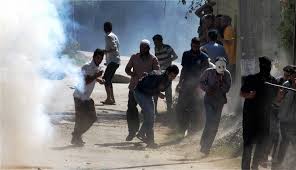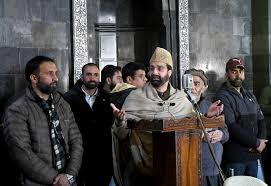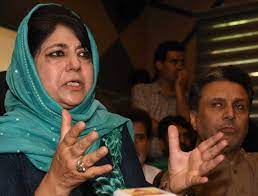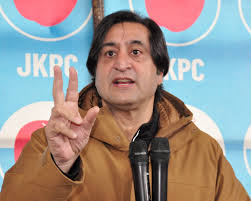A sensational sting by a television channel has proved conclusively in public that Hurriyat leaders organise disturbances in Kashmir, and receive hundreds of crores from Pakistan for this.
Senior separatist leader Naeem Khan admitted that they burnt 35 schools, as well as some hospitals, panchayat buildings, and police stations. Khan is the provincial president of the Tehreek-e-Hurriyat, the organisation that Syed Ali Shah Geelani founded and heads.
What should astound us is not just the fact that this happens but the fact that the government has allowed this sort of thing to happen, not just in the recent past but for decades.
For, none of this is new. Money has been coming to Kashmir — from Pakistan and elsewhere — since 1955 when the Plebiscite Front was formed. There was turmoil in the Valley during the 1980s, partly fermented by money from abroad.
That has only increased since. Pakistan’s outlays to sustain the Kashmir insurgency and militancy through the 1990s and beyond must have run to thousands of crores a year. The recording of Naeem made it clear that hundreds of crore were no big deal.
Throughout Saturday on 7 May, another television channel ran what it also called an expose. It showed that Ahmad Sagar of Srinagar is the conduit for Pakistani funding to Shabir Shah, another leader of the Tehreek-e-Hurriyat.
This too was old hat. Sagar has been doing that since at least the early 1980s. Not only that, in 1984, he established the Islamic Students League, of which Naeem Khan became the president in 1986 and Yasin Malik the general secretary.
Open collusion
Not only is none of this new, those who have run India’s spy operations have known all these for decades. Not only have they done nothing to stop it, they have actually facilitated it!
Amarjit Dulat, the leading figure among the spies who have handled Kashmir, wrote openly in a book he published in 2015 that money has been coming to Kashmir not just from Pakistan but also from New Delhi.
He should know. For more than two decades, he has engaged in competitive deal-making with various Hurriyat leaders, to outbid his Pakistani counterparts. Dulat is not the only one. Overall, India’s so-called intelligence set-up has been doing this for decades.
That’s not all. That is only part of what they have been up to. An even more astounding part of the shenanigans in Kashmir is that the intelligence agencies have routinely arranged jobs and promotions for close relatives of the most active anti-India leaders.
Just a few weeks ago, a major controversy erupted over the fact that Geelani’s grandson was given a plum job at the Sher-e-Kashmir International Conference Centre. Since the place is frequently used for high-security state functions (former prime minister Manmohan Singh has stayed at the hotel there, and Dulat stays when he visits), it is surely not possible for anyone to be employed there without clearance from security agencies.
The most astounding part of that revelation was that Geelani’s grandson was given the job at the height of last year’s agitations when most people could move around owing to a shutdown called by his grandfather. But the young man’s well-paid job is part of a long-established pattern.
Khan’s wife, Hameeda, for instance, is not only a teacher, but the head of the department of English at Kashmir University. People like her influence the appointment of the vice-chancellor.
Khan, who admitted to getting 35 schools burnt in order to create ‘chaos’, is generally very temperate in his anti-India talk compared with Hameeda. For years, she has obstreperously highlighted mass rapes, mass graves and other atrocities of the Indian state on the international conference circuit.
During an interaction of Kashmiri civil society with a visiting delegation of European Union ambassadors about five years ago, she sprawled on her arm across the dinner table as if she were falling asleep. Perhaps the professor thought that was an appropriate way to show disdain for another speaker. The vice-chancellor sat silently on the other side of the table.
That the Indian establishment turns a blind eye to all sorts of things is a horrifying aspect of the putrid mess in Kashmir.






